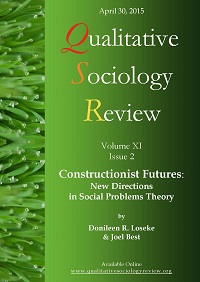Claims-Making and Human Rights in Domestic and International Spheres
DOI:
https://doi.org/10.18778/1733-8077.11.2.08Keywords:
Human Rights, Translation, Meaning, Claims-Making, Social ConstructionismAbstract
While the concept of human rights may seem basic, it is important for social constructionists to understand that the meaning of the term can vary from country to country. In this paper, I will examine the translation and meaning of human rights and human rights lawyer in Japanese. I show how the vagueness of the term is important and I demonstrate the dialectical relationship between domestic social issues and international organizations concerning human rights. I also demonstrate how the combination of powerful international organizations and domestic claims can sometimes be successful in changing a country’s policy.
Downloads
References
Ayukawa, Jun. 2001. “The United States and Smoking Problems in Japan.” Pp. 215-242 in How Claims Spread Cross-National Diffusion of Social Problems, edited by Joel Best. New York: Aldine de Gruyter.
Google Scholar
Ayukawa, Jun. 2011. “Constructivism.” In International Encyclopedia of Political Science, edited by Bertrand Badie, Dirk Berg-Schlosser, and Leonardo Morlino. Thousand Oakes: Sage.
Google Scholar
Best, Joel. 1990. Threatened Children: Rhetoric and Concern About Child-Victims. Chicago: University of Chicago Press.
Google Scholar
Iwatani, Juro. 2008. “Dejitaru de tsumugu Fukuzawa Yukichi no ho no kotoba: Kenri, kenri, tsugi [Words of Yukichi Fukuzawa Spin With Digital Text: Rights].” MediaNet 15. Retrieved January 30, 2015 www.lib.keio.ac.jp/publication/medianet/article/pdf/01500380.pdf
Google Scholar
Kinki bengoshi rengokai jinken yogo iinkai kokusai jinken bukai [Section of International Human Rights, Committee of Protection of Human Rights, Kinki Federation of Bar Associations] and Osaka bengoshi kai sentakugiteisho hijun suishin kyogikai [The Council for the Promotion of the Ratification of the Optional Protocols, Osaka Bar Association]. 2012. Kokusai jinken joyaku to kojin tsuho seido [The International Conventions of Human Rights and Individual Complaint Procedure]. Tokyo: Nippon-hyoron-sha.
Google Scholar
Loseke, Donileen R. 1999. Thinking About Social Problems: An Introduction to Constructionist Perspectives. New York: Aldine de Gruyter.
Google Scholar
Saiko Saibansho [The Supreme Court, Japan]. 2013 [Grand Bench Sept. 4]. 2012 (ku) no. 984 & 985. Saiko Saibansho Minji Hanreishu 1320. Retrieved February 05, 2015 http://www.courts.go.jp/hanrei/pdf/20130904154932.pdf
Google Scholar
Tonami, Koji et al. 2008. Yoroppa Jinken saibansho no hanrei [Essential Cases of the European Court of Human Rights]. Tokyo: Shinzan-sha.
Google Scholar
United Nations, Human Rights Committee. 2008. International Covenant on Civil and Political Rights, Consideration of Reports Submitted by State Parties Under Article 40 of the Covenant, Concluding Observations of the Human Rights Committee: CCPR/C/JPN/CO/5, October 30, 2008, 94th Session, Geneva, October 13-31, 2008.
Google Scholar
Wheaton, Martin. 1871. Bankoku Koho [International Public Law]. Translated by William Alexander Parsons. Tokyo. Yorozuya Heishiro.
Google Scholar
Downloads
Published
How to Cite
Issue
Section
License

This work is licensed under a Creative Commons Attribution-NonCommercial-NoDerivatives 4.0 International License.











